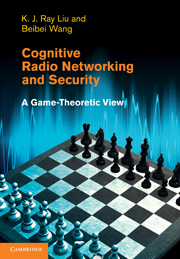Book contents
- Frontmatter
- Contents
- Preface
- Part I Cognitive radio communications and cooperation
- 1 Introduction to cognitive radios
- 2 Game theory for cognitive radio networks
- 3 Markov models for dynamic spectrum allocation
- 4 Repeated open spectrum sharing games
- 5 Pricing games for dynamic spectrum allocation
- 6 A multi-winner cognitive spectrum auction game
- 7 Evolutionary cooperative spectrum sensing games
- 8 Anti-jamming stochastic games
- 9 Opportunistic multiple access for cognitive networks
- Part II Resource awareness and learning
- Part III Securing mechanism and strategies
- References
- Index
4 - Repeated open spectrum sharing games
from Part I - Cognitive radio communications and cooperation
Published online by Cambridge University Press: 06 December 2010
- Frontmatter
- Contents
- Preface
- Part I Cognitive radio communications and cooperation
- 1 Introduction to cognitive radios
- 2 Game theory for cognitive radio networks
- 3 Markov models for dynamic spectrum allocation
- 4 Repeated open spectrum sharing games
- 5 Pricing games for dynamic spectrum allocation
- 6 A multi-winner cognitive spectrum auction game
- 7 Evolutionary cooperative spectrum sensing games
- 8 Anti-jamming stochastic games
- 9 Opportunistic multiple access for cognitive networks
- Part II Resource awareness and learning
- Part III Securing mechanism and strategies
- References
- Index
Summary
In dynamic spectrum access, users who are competing with each other for spectrum may have no incentive to cooperate, and they may even exchange false private information about their channel conditions in order to gain more access to the spectrum. In this chapter, we present a repeated spectrum sharing game with cheat-proof strategies. In a punishment-based repeated game, users have an incentive to share the spectrum in a cooperative way; and, through mechanism-design-based and statistics-based approaches, user honesty is further enforced. Specific cooperation rules have been developed on the basis of maximum-total-throughput and proportional-fairness criteria. Simulation results show that the scheme presented here can greatly improve the spectrum efficiency by alleviating mutual interference.
Introduction
In order to achieve more flexible spectrum access in long-run scenarios, we need to address the following challenges. First, in self-organized spectrum sharing, there is no central authority to coordinate the spectrum access of different users. Thus, the spectrum access scheme should be able to adapt distributively to the spectrum dynamics, e.g., channel variations, with only local observations. Moreover, users competing for the open spectrum may have no incentive to cooperate with each other, and they may even exchange false private information about their channel conditions in order to gain more access to the spectrum. Therefore, cheat-proof spectrum sharing schemes should be developed in order to maintain the efficiency of the spectrum usage.
Information
- Type
- Chapter
- Information
- Cognitive Radio Networking and SecurityA Game-Theoretic View, pp. 111 - 132Publisher: Cambridge University PressPrint publication year: 2010
